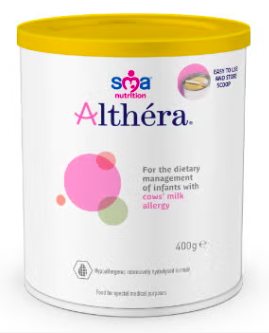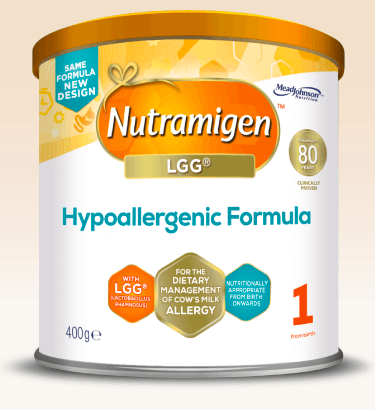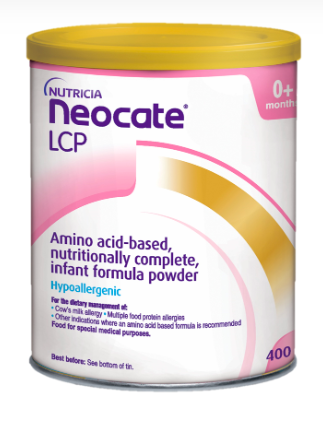What formula is suitable for babies with a milk allergy?
Written by Christina Hills, registered paediatric dietitian, and milk allergy specialist.
If your baby has a milk allergy the best form of treatment is exclusive breastfeeding until 6 months of age- possibly alongside a milk-free diet for the breastfeeding mother if this is needed.
If you choose to give formula in place of- or alongside- breastmilk, or if you are not able to breastfeed, you may be wondering, what is the best formula for a milk allergy baby?
If this is the case, your baby will need a specialist milk allergy formula. Standard off-the-shelf formulas are not suitable for babies with a milk allergy as they contain intact cows milk proteins.
Milk allergy formulas are usually still made with cows milk- but the proteins in them are broken down by enzymes which makes them less allergenic. Depending on how broken down they are, they are classified as either extensively hydrolysed or amino acid formulas, sometimes shortened to eHF or AA, respectively.
Breakdown of formula for cow’s milk allergy in the UK/ milk allergy formula for babies:
Extensively hydrolysed formula (eHF):
The milk proteins are broken down, making them easier to digest and less reactive than regular cow’s milk-based formula (examples include: Althera, Nutramigen with LGG, Aptamil Pepti)
Theoretically an extensively hydrolysed formula should be suitable for around 90% of babies with a milk allergy, although in practice it is usually less than this, with 10-30% or more being given an alternative amino acid formula.
Amino acid-based formula (AAF):
For more sensitive babies, these formulas are even more broken down- into amino acids, making it harder for the immune system to recognise the protein making them less allergenic (Examples: Neocate, Alfamino)
When to consider an amino acid formula in cows milk protein allergy?
If a baby is trialled on an eHF formula and the suspected milk allergy symptoms improve a little but do not completely go away, or in cases where there is no clear improvement in symptoms but a milk allergy is still suspected, then the MAP guidelines recommend to trial an amino acid formula. Sometimes, an amino acid formula is recommended first before an extensively hydrolysed, but it depends on the clinical situation.
Is Goat’s milk formula suitable for babies with milk allergy?
🐐 Goat’s milk contains similar proteins to cow’s milk and so is not usually suitable for babies with a milk allergy as most babies with a milk allergy will also react to goat’s milk, especially for those with IgE mediated milk allergy, therefore these should generally be avoided in the first instance with all moderate to severe milk allergy reactions. However, there is some evidence that goats milk may be tolerated in those with mild gut symptoms with non-IgE mediated milk allergy.
Can babies with a milk allergy soya formula?
Many of babies with cow’s milk allergy will also react to soya proteins found in soya products like soya milk and soya infant formula. This is thought to affect those with delayed gut symptoms more than those with IgE-mediated cow’s milk allergy. Soya formula should be avoided until at least 6 months of age due to concerns regarding the high concentration of phytoestrogens relative to small body size and possible impact on the growing infant. Soya formula is not currently available to buy in the UK.
Summary of formulas currently available in the UK for milk allergy
Here are the main extensively hydrolysed formulas available in the UK market at present along with some key characteristics:
Extensively hydrolysed milks
Aptamil pepti 1
Main ingredients:
Hydrolysed whey protein (from milk), Maltodextrin, Vegetable oils (Palm oil, Coconut oil, Rapeseed oil, High oleic sunflower oil, Sunflower oil), Galacto-oligosaccharides (GOS) (from milk)
Essential fat source:
Fish oil
Suitability:
Not suitable for vegetarians or Halal diet. UK kosher approval notes that Aptamil Pepti 1 is processed using pork trypsin enzyme, which is not present in the final product
Contains fish oil and coconut oil. Lactose free
Althera
Main ingredients:
Lactose, maltodextrin, vegetable oils (sunflower, rapeseed, coconut), hydrolysed whey protein (milk),
Essential fat source:
Also Crypthecodinium Cohii oil (DHA), Mortierella Alpina oil (ARA
Suitability:
Halal certified and suitable for vegetarians
Contains lactose. Contains coconut oil.
Nutramigen 1 with LGG
Main ingredients:
Glucose syrup, vegetable oils (palm olein, coconut, soya, high oleic sunflower), extensively hydrolysed casein (from milk), modified corn starch
Essential fat source:
Oil from Mortierella alpina and oil from the microalgae Schizochytrium sp.
Other:
Lactobacillus rhamnosus (LGG®) bacteria culture (0.02%) a probiotic
Suitability:
Not suitable for halal or kosher
Contains coconut and soya oil. Lactose free.
Amino acid formulas
Neocate LCP
Main ingredients:
Dried glucose syrup, refined vegetable oils (high oleic sunflower oil, coconut oil, rapeseed oil, sunflower oil)
Essential fat source:
Oil from Crypthecodinium cohnii and oil from Mortierella alpina
Suitability:
Halal, Kosher and Vegetarian suitable. Only products with Kosher approval or Halal certification have been identified here. (from company website)
Contains coconut oil. Lactose free.
Alfamino
Main ingredients:
Glucose syrup, vegetable oils (sunflower, rapeseed, structured palm oil)
Essential fat source:
Crypthecodinium Cohii oil (DHA), Mortierella Alpina oil (ARA)
Suitability:
Suitable for halal
Contains no coconut or soya oil. Lactose free.
Puramino formula
Main ingredients:
Glucose syrup, vegetable oils (high oleic sunflower, medium chain triglycerides from coconut/palm kernel (9.3%), soya), modified tapioca starch
Essential fat source:
Oil from Mortierella alpina, and oil from the microalgae Schizochytrium sp.
Suitability:
Suitable for halal or kosher diets
Contains coconut oil. Lactose free.







